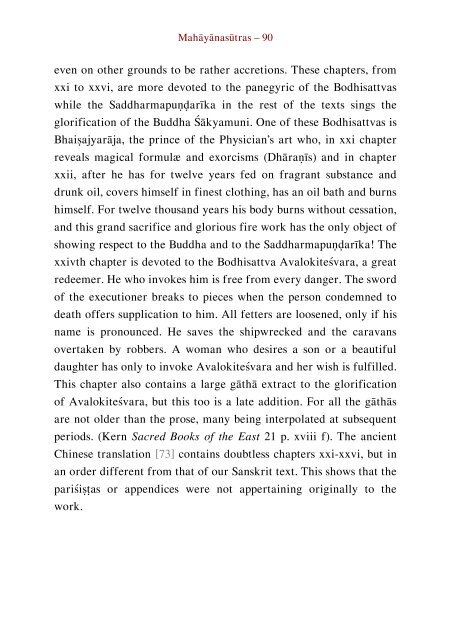Literary History of Sanskrit Buddhism
A study by J. K. Nariman of Sanskrit Buddhism from the Early Buddhist Tradition up to the Mahayana texts proper.
A study by J. K. Nariman of Sanskrit Buddhism from the Early Buddhist Tradition up to the Mahayana texts proper.
You also want an ePaper? Increase the reach of your titles
YUMPU automatically turns print PDFs into web optimized ePapers that Google loves.
Mahāyānasūtras – 90<br />
even on other grounds to be rather accretions. These chapters, from<br />
xxi to xxvi, are more devoted to the panegyric <strong>of</strong> the Bodhisattvas<br />
while the Saddharmapuṇḍarīka in the rest <strong>of</strong> the texts sings the<br />
glorification <strong>of</strong> the Buddha Śākyamuni. One <strong>of</strong> these Bodhisattvas is<br />
Bhaiṣajyarāja, the prince <strong>of</strong> the Physician’s art who, in xxi chapter<br />
reveals magical formulæ and exorcisms (Dhāraṇīs) and in chapter<br />
xxii, after he has for twelve years fed on fragrant substance and<br />
drunk oil, covers himself in finest clothing, has an oil bath and burns<br />
himself. For twelve thousand years his body burns without cessation,<br />
and this grand sacrifice and glorious fire work has the only object <strong>of</strong><br />
showing respect to the Buddha and to the Saddharmapuṇḍarīka! The<br />
xxivth chapter is devoted to the Bodhisattva Avalokiteśvara, a great<br />
redeemer. He who invokes him is free from every danger. The sword<br />
<strong>of</strong> the executioner breaks to pieces when the person condemned to<br />
death <strong>of</strong>fers supplication to him. All fetters are loosened, only if his<br />
name is pronounced. He saves the shipwrecked and the caravans<br />
overtaken by robbers. A woman who desires a son or a beautiful<br />
daughter has only to invoke Avalokiteśvara and her wish is fulfilled.<br />
This chapter also contains a large gāthā extract to the glorification<br />
<strong>of</strong> Avalokiteśvara, but this too is a late addition. For all the gāthās<br />
are not older than the prose, many being interpolated at subsequent<br />
periods. (Kern Sacred Books <strong>of</strong> the East 21 p. xviii f). The ancient<br />
Chinese translation [73] contains doubtless chapters xxi-xxvi, but in<br />
an order different from that <strong>of</strong> our <strong>Sanskrit</strong> text. This shows that the<br />
pariśiṣṭas or appendices were not appertaining originally to the<br />
work.


















